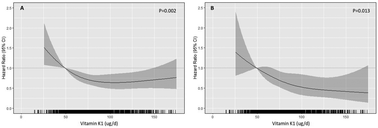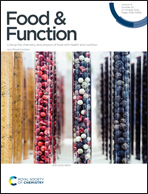Dietary Vitamin K1 intake is associated with lower long-term fracture-related hospitalization risk: the Perth longitudinal study of ageing women†
Abstract
This study examined the association between dietary Vitamin K1 intake with fracture-related hospitalizations over 14.5 years in community-dwelling older Australian women (n = 1373, ≥70 years). Dietary Vitamin K1 intake at baseline (1998) was estimated using a validated food frequency questionnaire and a new Australian Vitamin K nutrient database, which was supplemented with published data. Over 14.5 years, any fracture (n = 404, 28.3%) and hip fracture (n = 153, 10.7%) related hospitalizations were captured using linked health data. Plasma Vitamin D status (25OHD) and the ratio of undercarboxylated osteocalcin (ucOC) to total osteocalcin (tOC) from serum was assessed at baseline. Estimates of dietary Vitamin K1 intake were supported by a significant inverse association with ucOC : tOC; a marker of Vitamin K status (r = −0.12, p < 0.001). Compared to women with the lowest Vitamin K1 intake (Quartile 1, <61 μg d−1), women with the highest Vitamin K1 intake (Quartile 4, ≥99 μg d−1) had lower hazards for any fracture- (HR 0.69 95%CI 0.52–0.91, p < 0.001) and hip fracture-related hospitalization (HR 0.51 95%CI 0.32–0.79, p < 0.001), independent of 25OHD levels, as part of multivariable-adjusted analysis. Spline analysis suggested a nadir in the relative hazard for any fracture-related hospitalizations at a Vitamin K1 intake of approximately 100 μg day−1. For hip fractures, a similar relationship was apparent. Higher dietary Vitamin K1 is associated with lower long-term risk for any fracture- and hip fracture-related hospitalizations in community-dwelling older women.



 Please wait while we load your content...
Please wait while we load your content...